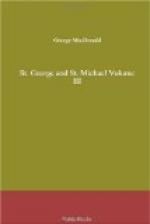’My son, where there is contention, a bone shall not fail. It is but a leg-bone now; it will be a rib to-morrow, and by and by doubtless it will be the skull itself.’
’If you care for none of these things, sir, will not master Flowerdew have a hard name for you? I know not what it means, but it sounds of the gallows,’ said Richard, looking rather doubtful as to how his father might take it.
’Possibly, my son, I care more for the contention than the bone, for while thieves quarrel honest men go their own ways. But what ignorance I have kept thee in, and yet left thee to bear the reproach of a puritan!’ said the father, smiling grimly. ’Thou meanest master Flowerdew would call me a Gallio, and thou takest the Roman proconsul for a gallows-bird! Verily thou art not destined to prolong the renown of thy race for letters. I marvel what thy cousin Thomas would say to the darkness of thy ignorance.’
’See what comes of not sending me to Oxford, sir: I know not who is my cousin Thomas.’
’A man both of learning and wisdom, my son, though I fear me his diet is too strong for the stomach of this degenerate age, while the dressing of his dishes is, on the other hand, too cunningly devised for their liking. But it is no marvel thou shouldest be ignorant of him, being as yet no reader of books. Neither is he a close kinsman, being of the Lincolnshire branch of the Heywoods.’
’Now I know whom you mean, sir; but I thought he was a writer of stage plays, and such things as on all sides I hear called foolish, and mummery.’
’There be among those who call themselves the godly, who will endure no mummery but of their own inventing. Cousin Thomas hath written a multitude of plays, but that he studied at Cambridge, and to good purpose, this book, which I was reading when you entered, bears good witness.’
‘What is the book, father?’
’Stay, I will read thee a portion. The greater part is of learning rather than wisdom—the gathered opinions of the wise and good concerning things both high and strange; but I will read thee some verses bearing his own mind, which is indeed worthy to be set down with theirs.’
He read that wonderful poem ending the second Book of the Hierarchy, and having finished it looked at his son.
‘I do not understand it, sir,’ said Richard.
‘I did not expect you would,’ returned his father. ’Here, take the book, and read for thyself. If light should dawn upon the page, as thou readest, perhaps thou wilt understand what I now say—that I care but little for the bones concerning which king and parliament contend, but I do care that men—thou and I, my son—should be free to walk in any path whereon it may please God to draw us. Take the book, my son, and read again. But read no farther save with caution, for it dealeth with many things wherein old Thomas is too readily satisfied with hearsay for testimony.’




